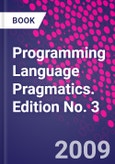Programming Language Pragmatics, Third Edition, is the most comprehensive programming language book available today. Taking the perspective that language design and implementation are tightly interconnected and that neither can be fully understood in isolation, this critically acclaimed and bestselling book has been thoroughly updated to cover the most recent developments in programming language design, inclouding Java 6 and 7, C++0X, C# 3.0, F#, Fortran 2003 and 2008, Ada 2005, and Scheme R6RS.
A new chapter on run-time program management covers virtual machines, managed code, just-in-time and dynamic compilation, reflection, binary translation and rewriting, mobile code, sandboxing, and debugging and program analysis tools. Over 800 numbered examples are provided to help the reader quickly cross-reference and access content.
This text is designed for undergraduate Computer Science students, programmers, and systems and software engineers.
Table of Contents
I. Foundations1. Introduction2. Programming Language Syntax3. Names, Scopes, Bindings4. Semantic Analysis5. Target Machine ArchitectureII. Core Issues in Language Design6. Control Flow7. Data Types8. Subroutines and Control Abstraction9. Data Abstraction and Object OrientationIII. Alternative Programming Models10. Functional Languages11. Logic Languages12. Concurrency13. Scripting LanguagesIV. A Closer Look at Implementation14. Building a Runnable Program15. Run-time Program Management
16. Code Improvement
Authors
Michael Scott Professor and past Chair of the Computer Science Department at the University of Rochester.Michael L. Scott is a professor and past Chair of the Computer Science Department at the University of Rochester. He is best known for work on synchronization and concurrent data structures: algorithms from his group appear in a wide variety of commercial and open-source systems. A Fellow of the ACM and the IEEE, he shared the 2006 Dijkstra Prize in Distributed Computing. In 2001 he received the University's Robert and Pamela Goergen Award for Distinguished Achievement and Artistry in Undergraduate Teaching.








